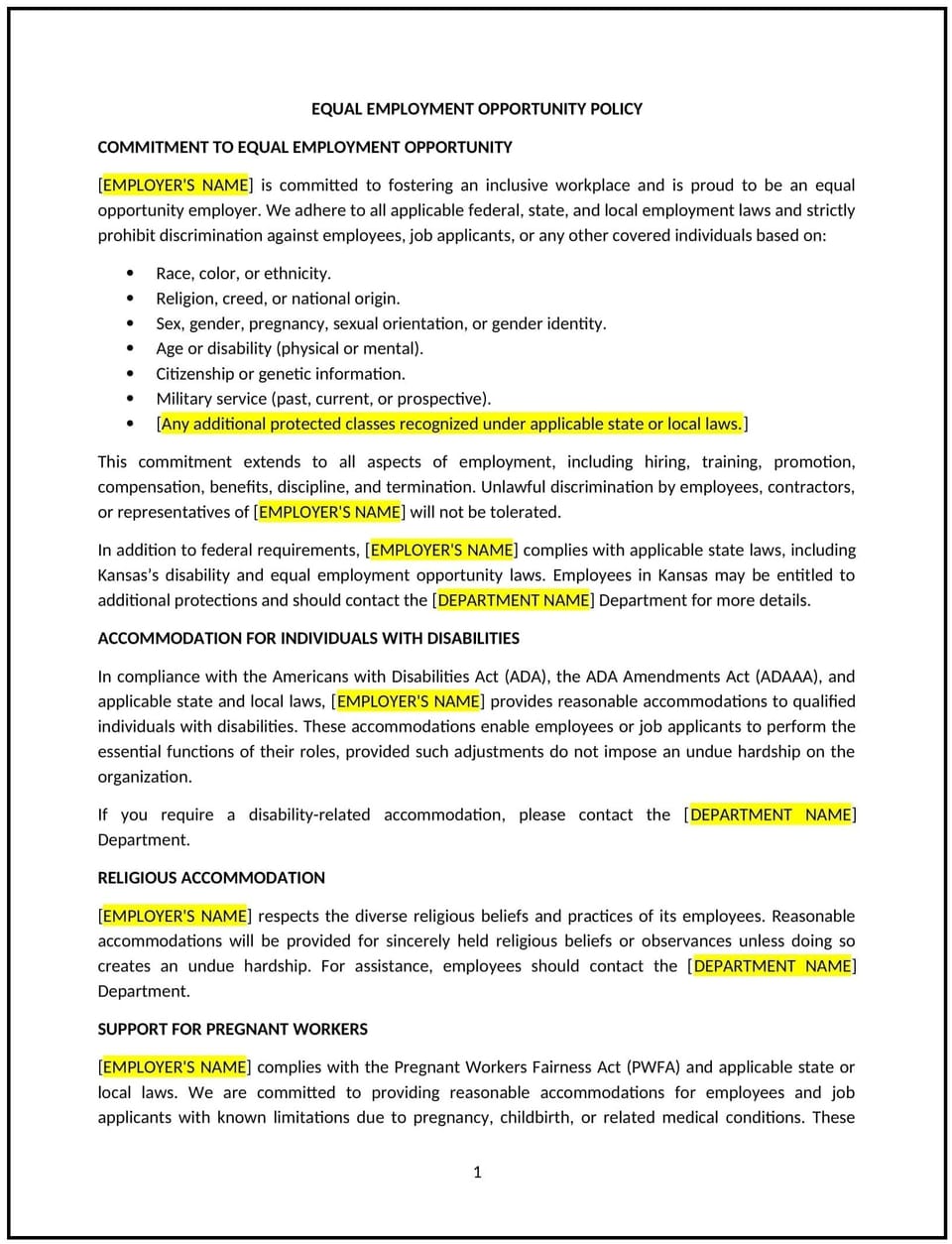Equal employment opportunity policy (Kansas): Free template

Equal employment opportunity policy (Kansas)
An equal employment opportunity (EEO) policy helps Kansas businesses establish a clear commitment to providing fair treatment and equal opportunities in hiring, promotions, and employment practices. This policy outlines the company’s stance on preventing discrimination and ensuring that all employees and job applicants are treated with respect, regardless of race, color, religion, gender, age, disability, sexual orientation, or any other protected status.
By implementing this policy, businesses can foster a diverse and inclusive work environment, promote fairness, and reduce the risk of discriminatory practices or legal issues.
How to use this equal employment opportunity policy (Kansas)
- Define protected categories: Businesses should specify the categories protected under EEO laws, such as race, gender, religion, age, disability, national origin, and other legally protected classes.
- Outline non-discrimination principles: Businesses should establish a clear commitment to providing equal opportunity in all aspects of employment, including hiring, promotions, compensation, training, and termination.
- Provide reasonable accommodation procedures: Businesses should define the process for requesting accommodations for employees with disabilities or religious practices, ensuring that reasonable adjustments are made where necessary.
- Establish complaint procedures: Businesses should provide a structured process for employees to report discrimination or harassment, ensuring complaints are taken seriously and addressed promptly.
- Promote diversity and inclusion: Businesses should encourage a diverse workforce by implementing inclusive hiring practices, diversity training, and mentorship programs.
- Educate employees: Businesses should provide training to all employees on the importance of equal employment opportunity and how to identify and prevent discrimination.
- Review and update regularly: Businesses should periodically review and update the policy to ensure it remains relevant to changes in the law and workplace needs.
Benefits of using an equal employment opportunity policy (Kansas)
- Promotes fairness and inclusivity: Ensures that all employees and applicants have equal access to opportunities, fostering a more diverse and respectful work environment.
- Reduces discrimination risks: Helps businesses comply with anti-discrimination laws and minimizes the risk of lawsuits or legal challenges related to employment practices.
- Strengthens company reputation: Demonstrates the business’s commitment to diversity, equity, and fairness, which can enhance its reputation with employees, customers, and the public.
- Encourages employee satisfaction: A workplace that values equal opportunity is more likely to have higher employee morale and engagement.
- Increases retention: Employees are more likely to stay with a business that values diversity and fair treatment in the workplace.
- Improves hiring practices: Encourages businesses to implement inclusive recruitment strategies, leading to a broader pool of talent.
Tips for using this equal employment opportunity policy (Kansas)
- Communicate the policy effectively: Businesses should ensure that all employees and job applicants are aware of the EEO policy through employee handbooks, job postings, and training sessions.
- Implement training programs: Businesses should provide regular diversity and inclusion training for all employees, particularly hiring managers and supervisors.
- Foster a supportive environment: Businesses should actively create an inclusive culture that welcomes diverse perspectives and treats all employees with respect.
- Address complaints promptly: Businesses should take quick action to address any complaints or allegations of discrimination to maintain trust and prevent potential legal issues.
- Monitor hiring practices: Businesses should track their recruitment and hiring efforts to ensure they are attracting and hiring a diverse pool of candidates.
- Regularly review the policy: Businesses should evaluate the effectiveness of their EEO policy and update it as necessary to address any changes in the legal landscape or workplace culture.
Q: Why should Kansas businesses implement an equal employment opportunity policy?
A: Businesses should implement an EEO policy to promote fairness, reduce discrimination risks, and create a more inclusive and respectful work environment.
Q: What protected categories should businesses include in their EEO policy?
A: Businesses should include categories such as race, color, religion, gender, age, disability, national origin, sexual orientation, and any other legally protected classifications.
Q: How can businesses handle requests for reasonable accommodations?
A: Businesses should establish a clear process for employees to request accommodations for disabilities or religious practices, ensuring that reasonable adjustments are made without causing undue hardship on the business.
Q: What should businesses do if an employee files a discrimination complaint?
A: Businesses should take the complaint seriously, investigate it thoroughly, and address any issues promptly while ensuring the employee’s confidentiality and protection from retaliation.
Q: How can businesses promote diversity in their hiring practices?
A: Businesses should implement inclusive recruitment strategies, such as expanding outreach efforts to diverse candidate pools, using unbiased interview processes, and offering training to hiring managers.
Q: How often should businesses review and update their equal employment opportunity policy?
A: Businesses should review their EEO policy annually or whenever there are changes in the law, workplace practices, or organizational goals to ensure the policy remains effective and current.
This article contains general legal information and does not contain legal advice. Cobrief is not a law firm or a substitute for an attorney or law firm. The law is complex and changes often. For legal advice, please ask a lawyer.


